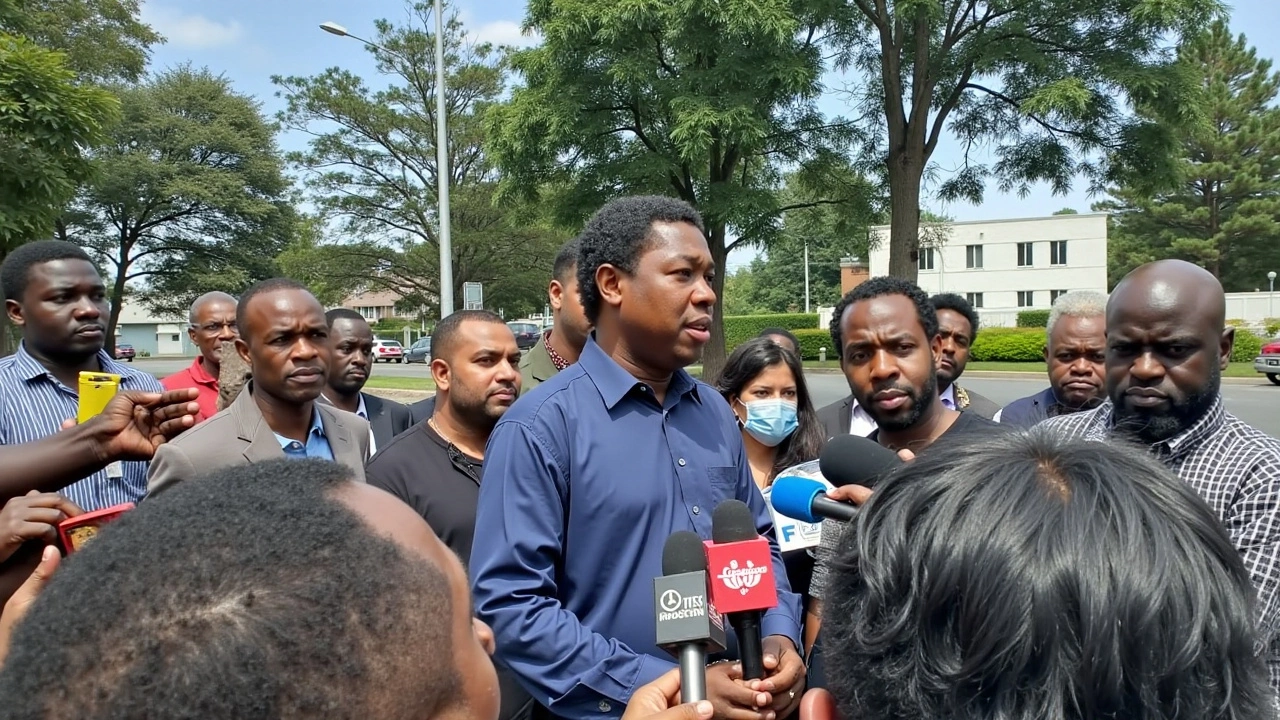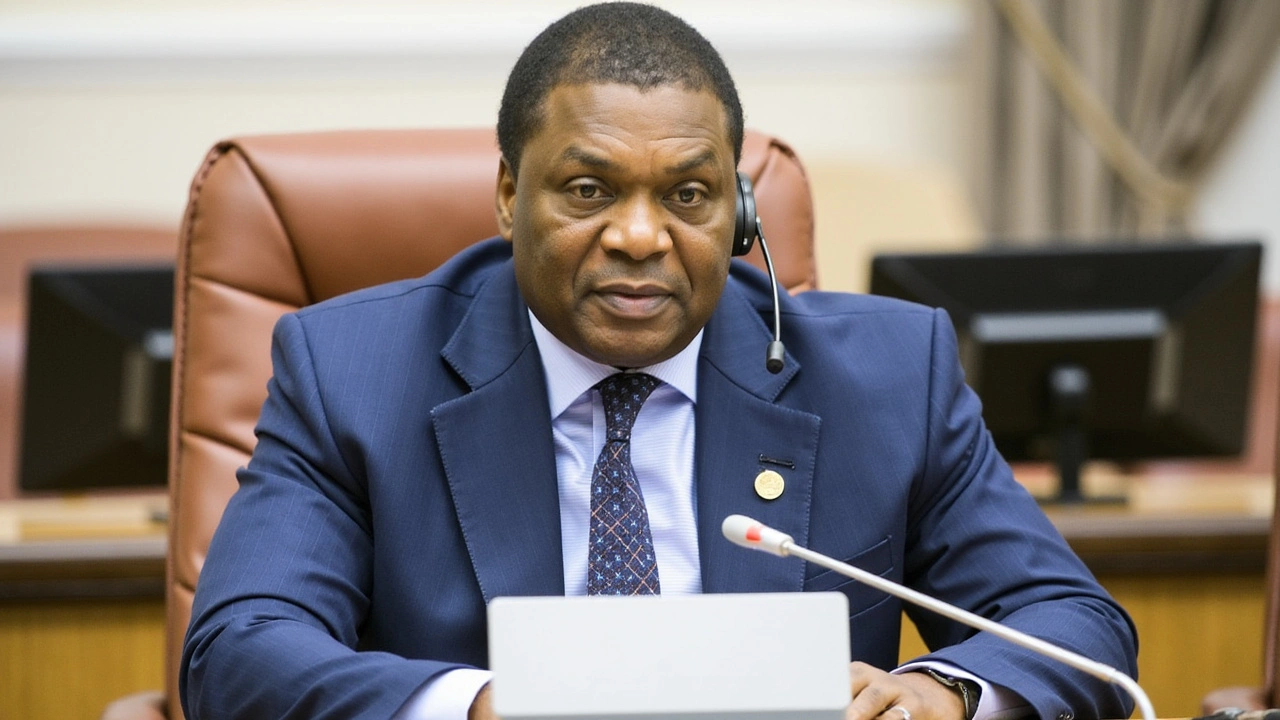Kenyans Grapple with Alarming Surge in Youth Abductions
In recent months, the unsettling rise in abductions of young people across Kenya has emerged as a grave concern, drawing attention not only from local leaders but also highlighting underlying systemic issues within the nation's fabric. Public Service Cabinet Secretary Justin Muturi has called for immediate and profound action from the country's leadership. Addressing the media after a recent discovery of the remains of two young victims in Nairobi, Muturi underscored the urgency of President William Ruto establishing a commission dedicated to thoroughly investigating these unsettling disappearances. This plea for a national dialogue shines a light on a problem that's threatening to unravel societal order, with the potential for chaos looming large if not addressed promptly.
Kenya's Internal Struggles Amidst Foreign Engagements
Kenya's involvement in resolving foreign conflicts, particularly in the Democratic Republic of Congo (DRC), contrasts starkly with its failure to effectively manage its homeland crises, including these harrowing bouts of abductions. Muturi poignantly questioned the government's priorities, challenging the rationale of pouring resources into international endeavors while significant domestic problems gnaw at the country's core. Muturi's remarks at the Nairobi Funeral Home, in light of the tragic fate of Justus Mutumwa and Martin Mwau, two of the infamous 'Mlolongo Three', eloquently capture the current sense of disillusionment felt by many Kenyans. His observations speak to a broader call for accountability amongst government officials and an appeal for genuine efforts to halt enforced disappearances and extra-judicial killings threatening community trust.
A Personal Narrative of Rescue and Its Broader Implications
Muturi recounted a personal incident where his own son fell victim to such a heart-wrenching abduction, a story that adds an emotional layer to his advocacy. Fortunately, by a stroke of fortune and political privilege, the President's intervention secured his son's release, an option unavailable to myriad ordinary Kenyans mired in similar nightmares. This vivid anecdote underscores the perilous reality for countless families, whose ceaseless, often futile searches for their loved ones span exhaustive weeks without respite or hope for resolution. His story is a stark reminder of the discomforting disparity between those with direct access to the echelons of power and the many left to grapple with systemic indifference.

Consequences of Inaction: A Call for Unification and Inquiry
The gravity of these abductions isn't isolated to individual stories of tragedy. It reflects a deeper societal failing that demands comprehensive and multi-faceted redress. Muturi insists that the proposed commission should draw representatives from diverse sectors — including the Law Society, religious organizations, and civil society groups — to lend their insights and vigor to unraveling the truth behind these heinous acts. He urges a nationwide call to action because when parents are left to scour for missing children while the state continues with economic deliberations, it signals a troubling disconnect from the people's pressing realities.
Nakuru Killings: A Stark Reminder of Impunity
Further exacerbating the matter are incidents like the widely publicized killings in Nakuru. These unsettling events, reportedly perpetrated by security personnel, are a chilling reminder of the existing impunity, which Muturi argues is in stark contradiction to claims of ignorance among law enforcement agencies. Kenya boasts one of the most competent police forces in the region, yet these recurring issues reveal a fissure in public trust and institutional accountability, pressing the need for immediate reform and ensuring that justice is no longer a privilege but a right assured to every Kenyan citizen.
The International Perspective: A Global Context for Local Issues
Muturi's plea for intervention echoes beyond the borders of his nation, overlapping with mounting unrest in the DRC. As protests aimed at foreign embassies gain momentum amidst accusations of complicity in regional conflicts, Kenya's role ventures into a contentious space, questioning how the nation can effectively contribute to solving conflicts abroad while grappling with unresolved domestic turmoils. These concerns set the stage for a pivotal turning point, urging introspection and realignment of national priorities — from fighting issues abroad to fortifying the peace and stability within.

Damian Liszkiewicz
February 1, 2025 AT 06:26It’s heartbreaking to see a nation’s children caught in a cycle of fear, especially when officials can mobilise resources abroad while families back home are left in anguish. 🤔 The rise in abductions isn’t just a statistic – it represents shattered families, sleepless nights, and a deep mistrust in institutions. We need a commission that’s diverse, transparent, and truly empowered to dig into the systemic roots of these disappearances. 🙏 Without genuine community involvement, any inquiry will feel like a token gesture. Let’s hope this conversation sparks tangible change across Kenya.
Angela Arribas
February 8, 2025 AT 05:06Honestly, the government’s lip‑service on this issue reads like a badly edited draft – filled with empty promises and no concrete action. 😒 The lack of accountability is simply unacceptable.
Sienna Ficken
February 15, 2025 AT 03:46Oh sure, let’s keep sending troops overseas while our kids are essentially playing a real‑life game of hide‑and‑seek that nobody wants to join. The whole “global peacekeeper” act is starting to feel like a fancy excuse to dodge the mess at home. If only the same enthusiasm were directed toward cracking down on those shadowy networks that thrive on fear, maybe we’d see fewer headlines about missing teens. Instead, we get another round of polite press conferences and vague promises. It’s almost comical, if it weren’t so tragic.
Zac Death
February 22, 2025 AT 02:26When I read about the surge in youth abductions, my mind immediately jumps to the underlying social fabric that’s been fraying for years, and the fact that the very people who are supposed to protect us seem more focused on diplomatic chess games than on the safety of their own citizens. It’s not just about a handful of cases; it’s about a pattern that suggests systemic failure, a lack of coordination between law enforcement agencies, and perhaps even complicity at higher levels. The cabinet secretary’s call for a commission is a step in the right direction, but without clear jurisdiction, transparent funding, and genuine independence, it risks becoming another bureaucratic exercise. Moreover, the inclusion of civil society groups, religious leaders, and legal experts could provide the necessary checks and balances that the current system lacks. We also need to ask why resources are being allocated to external conflicts while a domestic crisis is escalating unchecked. The paradox of Kenya’s international engagements versus its internal turmoil is stark, and it tells us a lot about government priorities. Financial aid, training, and equipment that could bolster internal security are being diverted elsewhere, leaving vulnerable communities exposed. The families of missing children deserve more than sympathy; they need action, concrete investigations, and swift justice. There’s a growing sense of impunity, especially when security forces are implicated in incidents like the Nakuru killings, which only fuels public distrust. A commission that is truly representative could also serve as a platform for victims’ families to share their stories, something that has been sorely missing from public discourse. It would also enable data collection that could reveal trends, hotspots, and perhaps the links to organized crime syndicates that thrive on kidnapping. As we consider the broader regional context, we must remember that instability in neighboring countries can spill over, but that does not absolve the state of its responsibility to safeguard its own people. The international community’s focus on Kenya’s role in the DRC should not eclipse the pressing need for domestic reforms. Ultimately, the success of any commission will depend on political will, transparent processes, and societal involvement. If those elements align, maybe Kenya can finally turn the tide on this heartbreaking crisis.
Lizzie Fournier
March 1, 2025 AT 01:06Exactly, a balanced approach that marries external diplomacy with internal security could make a huge difference. Let’s hope the commission gets the backing it truly needs.
JAN SAE
March 7, 2025 AT 23:46Listen up-this is not a drill; the situation demands immediate, decisive, and coordinated action! The government must allocate clear budgets, appoint independent investigators, and set strict timelines! Only then can we break the cycle of fear and restore confidence-people deserve answers, not excuses.
Steve Dunkerley
March 14, 2025 AT 22:26The prevalence of abductions signals a breakdown in inter‑agency intelligence sharing, which undermines operational effectiveness across the security sector. A multidisciplinary task force, integrating forensic analysis, community policing, and legal oversight, could mitigate these gaps. Such a framework would streamline data pipelines, enhance situational awareness, and facilitate rapid response protocols.
Jasmine Hinds
March 21, 2025 AT 21:06Finally some real talk 😤
Madison Neal
March 28, 2025 AT 19:46It’s heartbreaking to think about families endlessly searching for their loved ones while the system turns a blind eye. We need to amplify these voices and push for systemic change that prioritizes citizen safety above all else. Every child deserves the right to come home.
John Crulz
April 4, 2025 AT 19:26Honestly, the whole thing feels like a classic case of “talk the talk but not walk the walk.” If the leadership can’t demonstrate tangible progress, public trust will keep eroding. Let’s keep the pressure on them to deliver concrete results.
Anita Drake
April 11, 2025 AT 18:06These abductions are a stark reminder that national unity must start at home, with policies that protect every citizen. By engaging cultural leaders and community networks, Kenya can build resilient structures that deter such crimes. It’s time for inclusive action that bridges the gap between government and the people.